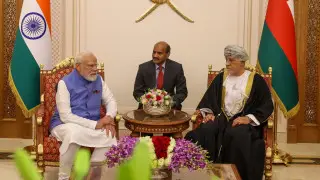
Flickr
New Delhi: A new study by Harvard University's Human Flourishing Program delves into the intriguing possibility of "cryptoterrestrials" – intelligent beings residing secretly on Earth. This research, led by Dr. Emily Roberts, explores various theories that have captivated humanity for centuries, from hidden ancient civilizations to encounters with otherworldly creatures.
Dr. Roberts and her team meticulously combed through historical accounts, folklore, and reported encounters from diverse cultures across the globe. Their objective? To assess the potential validity of cryptoterrestrial theories and their connection to modern-day phenomena like Unidentified Aerial Phenomena (UAP).
"Our research bridges the gap between scientific inquiry and cultural mythology," explains Dr. Roberts. "We aimed to investigate the possibility of hidden terrestrial beings that challenge our current scientific understanding."
Published in the journal Scientific Reports, the study examines diverse cases, including the discovery of unusual skeletal remains, rumors of subterranean civilizations, and historical accounts of encounters with beings from beyond our world. One noteworthy example is the Atacama skeleton, initially believed to be extraterrestrial but later identified as a human fetus with genetic abnormalities.
"We analyzed a broad spectrum of evidence, ranging from archaeological finds to contemporary UAP reports," says Dr. Roberts. "While some accounts may appear fantastical, they offer valuable insights into human perception and cultural belief systems."
The research team also delved into the concept of hidden bases, potentially located underground or underwater, that could house cryptoterrestrials. Claims of such facilities in remote locations like Antarctica or the ocean depths have long captivated conspiracy theorists and UFO enthusiasts.
"While the lack of empirical evidence surrounds many of these claims, they highlight our collective fascination with the unknown and the possibility of hidden realms," observes Dr. Roberts.
The study emphasizes the importance of critical thinking and skepticism when evaluating extraordinary claims. "We must approach these theories with caution and a healthy dose of doubt," remarks Dr. Roberts. "While they may ignite curiosity and imagination, scientific inquiry demands explanations grounded in evidence."
The Harvard study has reignited interest in the enigmatic realm of cryptoterrestrials and their potential influence on human culture and mythology. "This research opens doors for interdisciplinary exploration and encourages dialogue between science and folklore," concludes Dr. Roberts. "The truth may remain elusive, but the pursuit of knowledge enriches our understanding of the world around us."
While a recent NASA investigation into hundreds of UFO sightings revealed no conclusive evidence of alien involvement, the agency acknowledged the possibility without ruling it out. This highlights the ongoing quest to understand the mysteries of the universe and the potential existence of life beyond Earth.













Copyright © 2025 Top Indian News
